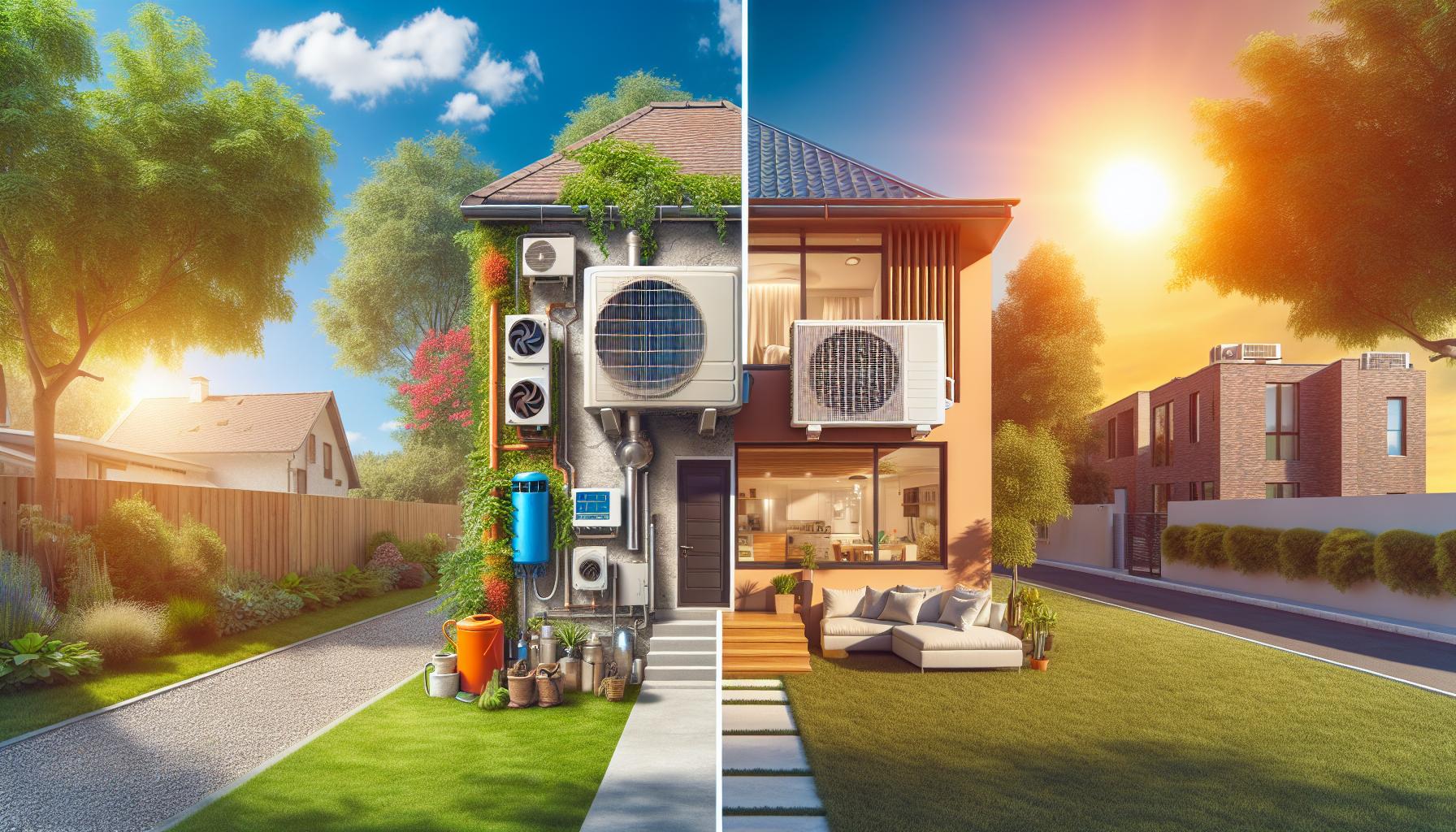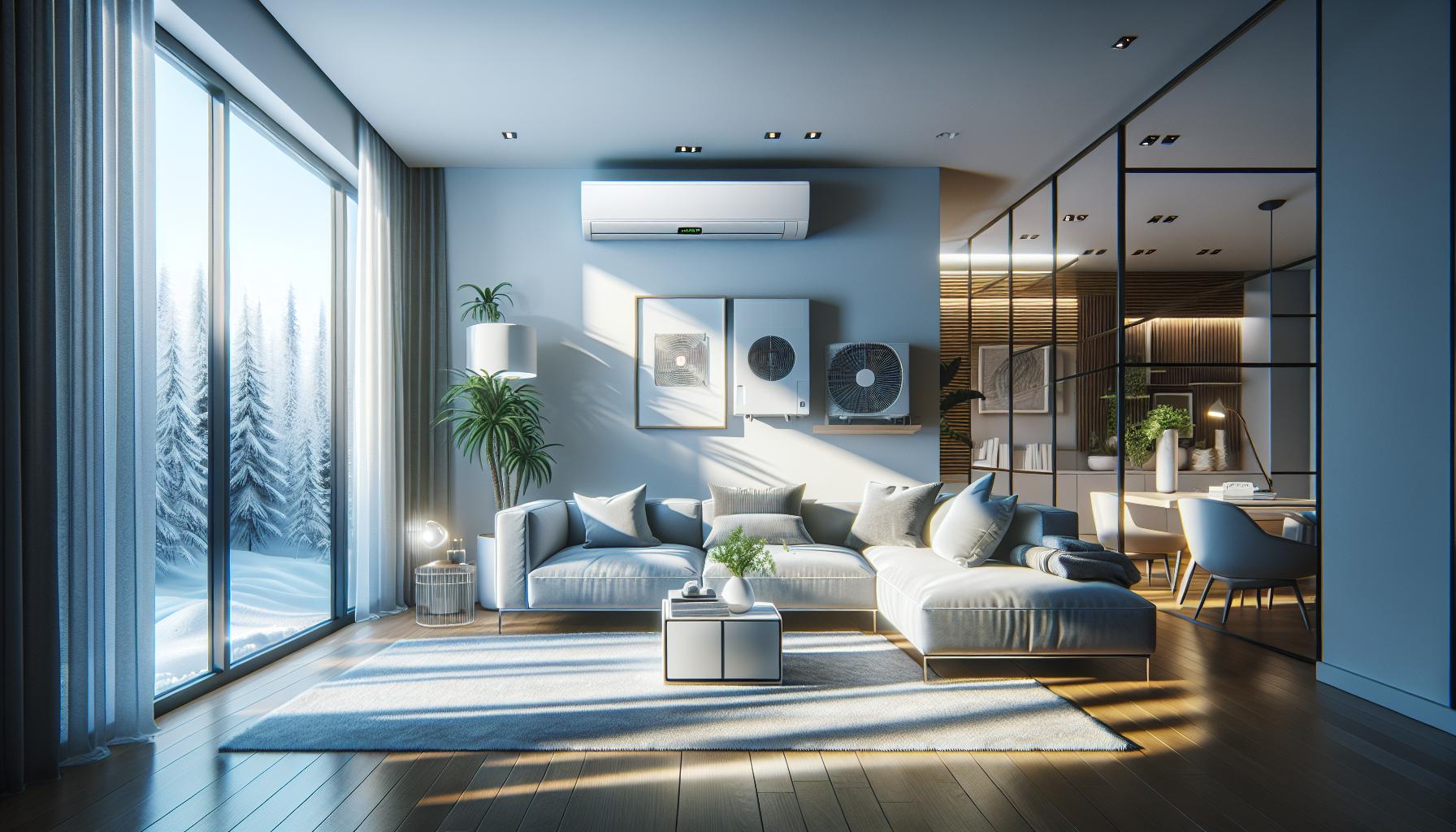Choosing the right climate control system for your home can be daunting. With the rising focus on energy efficiency and sustainability, understanding the differences between heat pumps and air conditioners (ACs) is more crucial than ever. This article aims to demystify these systems, helping you make an well-informed choice that suits your needs and budget.
You’ll explore how heat pumps and ACs operate, their benefits, and their limitations. By the end, you’ll have a clear grasp of which system offers the best performance for your specific circumstances. Whether you’re looking to reduce your carbon footprint or simply save on energy bills, this guide will provide the insights you need.
Overview Of Heat Pumps And Air Conditioners
Choosing between a heat pump and an air conditioner can be challenging, given the emphasis on energy efficiency and sustainability. This section clarifies their differences, helping you make an well-informed choice.
What Is A Heat Pump?
A heat pump is a versatile HVAC system that heats and cools your home. It transfers heat from one location to another, rather than generating it from fuel.
What Is An Air Conditioner?
An air conditioner cools your home by removing heat from the indoor air and releasing it outside. It uses a compressor, condenser, and evaporator coil to perform this function efficiently.
Efficiency Comparison

Choosing between a heat pump and an air conditioner involves understanding their efficiency in different contexts. This section explores their energy consumption and performance in various climates.
Energy Consumption
Heat pumps typically have higher efficiency ratings, especially in moderate climates, thanks to their SEER and HSPF ratings. Air conditioners focus solely on cooling with SEER ratings, making them less versatile.
Performance In Different Climates
Heat pumps excel in mild climates due to their efficient heating and cooling. But, in extreme cold, their efficiency drops. Air conditioners are effective in hot climates, providing reliable cooling without the heating option of heat pumps.
Cost Analysis
Understanding the costs associated with heat pumps and air conditioners is crucial to making an well-informed choice.
Initial Cost
- Heat Pumps:
- Heat pumps usually have higher initial costs compared to central air conditioners. The wholesale prices for heat pumps range from $2,520 to $4,606, depending on the model and efficiency rating. After tax credits and rebates, the net cost can be significantly lower. For instance, a Gree Flexx 18 SEER Heat Pump could cost $1,167 after a $1,560 tax credit.
- Installation costs, including labour and accessories, can average around $12,480 after incentives.
- Total costs, including installation, can range from $3,276 to $5,920.
- Air Conditioners:
- Central air conditioners typically have lower initial costs, ranging from $2,964 to $5,850. But, this excludes the cost of a separate heating system, which could add an additional $2,190 to $5,290.
Maintenance And Operating Costs
Heat pumps generally have lower operating costs due to their higher energy efficiency. They save on energy bills, especially in moderate climates. Air conditioners, while less versatile, also have manageable maintenance costs, primarily focusing on cooling. Regular servicing ensures both systems run efficiently, avoiding expensive repairs.
Environmental Impact
Evaluating the environmental impact of heat pumps compared to air conditioners (ACs) involves looking at several factors, including greenhouse gas emissions and the use of refrigerants. This examination helps you understand how each system affects the environment, aiding in making an well-informed choice.
Greenhouse Gas Emissions
Heat pumps generally reduce greenhouse gas emissions. They use less energy than traditional HVAC systems. For instance, a heat pump can cut heating-related fossil fuel use by 40% or more. When powered by renewable electricity, their carbon footprint drops significantly, enhancing their eco-friendliness.
Use Of Refrigerants
Heat pumps and ACs both use refrigerants, but the type of refrigerant can vary. Modern heat pumps often use R-410A, which has a lower impact on the ozone layer than older refrigerants like R-22. Choosing a system with an eco-friendly refrigerant reduces environmental harm and aligns with regulatory standards.
Pros And Cons
Choosing between a heat pump and an air conditioner (AC) can be challenging. Understanding their benefits and drawbacks can help you decide which system suits your needs best.
Benefits of Heat Pumps
Heat pumps provide both heating and cooling, making them versatile. They can save up to 50% on energy consumption, especially in moderate climates, leading to lower utility bills.
Drawbacks of Heat Pumps
Heat pumps can be less efficient in extreme cold. They often have higher initial costs, ranging from $2,520 to $4,606, and installation can average around $12,480.
Benefits of Air Conditioners
Air conditioners effectively cool homes, particularly in hot climates. They generally have lower initial costs, ranging from $2,964 to $5,850, and offer reliable cooling performance.
Drawbacks of Air Conditioners
Air conditioners lack heating capabilities. They require a separate heating system, which can add an additional $2,190 to $5,290, increasing overall costs.
Conclusion
Choosing between a heat pump and an air conditioner depends on your specific needs and circumstances. Heat pumps offer greater versatility and energy efficiency, particularly in moderate climates, but come with higher initial costs. On the other hand, air conditioners are excellent for cooling in hot climates and have lower upfront costs, though you’ll need a separate heating system.
Consider the long-term savings, environmental impact, and initial investment. Whether you’re aiming to reduce your carbon footprint or optimise energy costs, understanding these key differences will help you make an well-informed choice tailored to your home and lifestyle.
